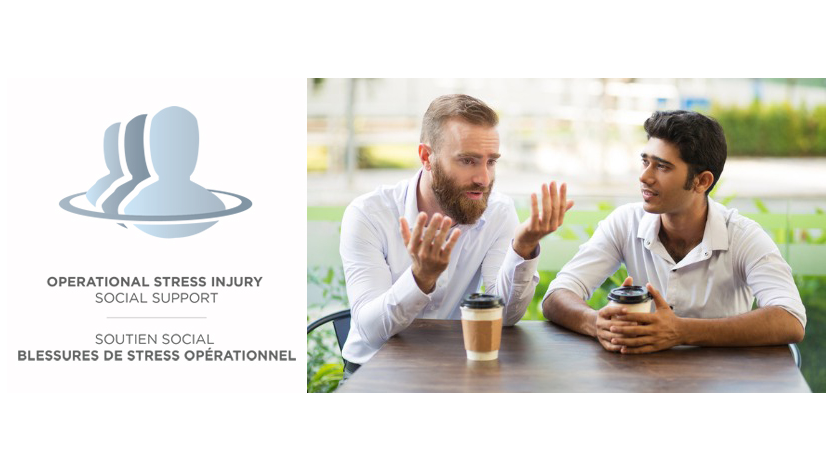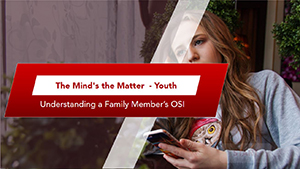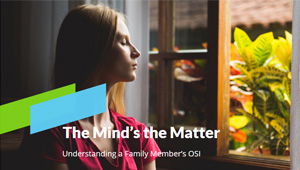Operational Stress Injury Social Support (OSISS)

The Power of Peer Support
Welcome to OSISS! We provide a national peer support network for Canadian Armed Forces members, veterans and their families who are experiencing an Operational Stress Injury (OSI).CAF Members / Veterans
-
What is an OSI?
An Operational Stress Injury is any persistent psychological difficulty resulting from operations in the military. Those operational duties can include training incidents, domestic operations and international operations.
Persistent psychological difficulties: Possible experiences and behaviours: - Anxiety
- Depression
- Post Traumatic Stress Disorder (PTSD)
- Sleep disorders
- Other conditions - e.g. addictions (substance or behavioral), anger issues
- Lethargic or lacking energy
- Loss of passion or enthusiasm
- Struggle to maintain daily activities
- Hypervigilant or fear of large groups
- Optimism has turned to pessimism
- Anger and aggression
Possible Contributors to an OSI
There are different factors and experiences that may contribute to an OSI. Four possible contributors are: Trauma, Fatigue, Grief, and Moral Injury. A person’s experience of an OSI may come from a single area of impact or may be a combination of any of these contributors. Here are some examples for each contributor:
Trauma or Impact Injury
IED explosion
Training accident
Witnessing an incidentFatigue or Wear and Tear
Burnout back home
Being responsible for the safety of other people
Multiple tours/taskingsGrief Injury
Loss of people you knew
Anticipatory loss
Loss of “normal”; loss of previous self
Losing the partner they knew beforeMoral Injury or Loss
Witnessing an event but being unable to help
Guilt and shame; things that weren’t done
Having no control
Moral injury is a loss injury; a disruption in our trust that occurs within our moral values and beliefs. Any events, action or inaction transgressing our moral/ethical beliefs, expectations and standards can set the stage for moral injury. (Moral Injury, CAMH, 2017). -
Coping Tips and Strategies
These are short term strategies. We recommend consulting your physician to access a broader range of services.
General Sleep/Nightmares - Set small goals. If that means all you can do today is take a shower, then do that.
- Schedule your appointments to minimize stress.
- Learn strategies to help with symptoms like anxiety in crowds, anger and memory issues. Believe it or not, there are ways to cope!
- Manage expectations and be realistic. Recovery takes time.
- Identify people who can support you. Recovery is often more successful with support.
- Communicate with your family and friends. It is likely they know something is happening and they want to know how to support you.
- Minimize caffeine and alcohol.
- Try not to nap during the day.
- Do not use a device with a bright screen in the hour before bed (Smartphone, laptop, etc.).
- Try to avoid subjects that may trigger symptoms before bed (particular TV shows, particular reading, intense conversations).
- Exercise regularly.
- Practice relaxation exercises.
Crowds Memory loss - Determine if there is a less busy time to do the activity.
- Communicate the plan (how long will we stay, where do we meet if we get separated, etc.) to minimize unexpected situations.
- Discuss compromise… (I really want to go to the concert… Is there a smaller venue, do we go 5 minutes after the show is started so that the crowd is seated, do I go alone?)
- Use memory aides, such as lists, post-it notes, day timers, iPod, etc.
- Keep expectations realistic.
- Make To-Do lists short.
- Keep a routine.
- Get adequate rest.
Lack of intimacy Angry outbursts - Seek outside help from a counsellor.
- Realize you may have to look for new ways to build intimacy.
- Revisit something that you both enjoyed doing together when you first met. **Discuss beforehand and be sure that both of you feel safe doing it. Allow modification.
- Find ways to laugh together.
- Agree to set aside an hour that you spend together (going for a walk, talking about a book, going for a drive to a coffee shop) that you are NOT allowed to bring up, refer to, blame, or do charades in reference to the OSI or the issues in relation to it.
- Postpone the conversation/disagreement until later, but don’t avoid it.
- Try to stay calm, use grounding techniques.
- Ask for space.
- Be accountable for your actions.
- Keep everyone safe and leave if you need to.
- Try to recognize indicators that you are getting agitated before you lash out (breathing changes, feeling tense etc.).
-
Getting Help
Having an OSI can be difficult. You may avoid family and friends or stop doing things that you once enjoyed. Your family may also start avoiding the same things, as they may adapt their behaviours, moods and routines to yours. You may feel guilt or frustration because you are struggling with your physical or mental health concerns.
There is a community around you that is going through what you are right now. OSISS can help you tap into our community and its compassion, wisdom and experience. Whether it is one-on-one or group activities, you have the choice of what type of support to participate in. Your first step is to contact an OSISS Coordinator. They will provide hope, acceptance and non-judgement as someone who has walked in your shoes.
OSISS interactions are kept confidential and respectful, at all times. We always ensure your safety is paramount. -
Resources
PTSD Coach Canada:
The PTSD Coach Canada mobile app can help you learn about and manage symptoms that can occur after trauma.
Features include:
• Reliable and current information on PTSD and about treatments that are effective
• Tools for screening and tracking your symptoms
• Convenient, easy-to-use tools to help you manage stress symptoms
• Information on crisis support and how to get help
Websites and Phone Lines:- Veterans Affairs Canada
- Soldier On
- Royal Canadian Legion
- Canadian Mental Health Association
- CFMAP (Canadian Forces Members Assistance/Veterans Affairs Canada Assistance Line): 1-800-268-7708
- Veterans Affairs Canada Assistance Program: 1-800-268-7708
Family Member and Friends
-
Compassion Fatigue
One of the biggest focuses for family peer support with OSISS is understanding and avoiding compassion fatigue. When a loved one is ill, caregivers will often take on more than their share of responsibility and continue to do so after the critical point has already passed.
“When I was first told that the changes in my family may be permanent, I didn’t know that I would need to grieve the loss to move forward!”
Many caregivers will put their own needs at the bottom of the list or feel guilty for prioritizing their own wellbeing. This can lead to exhaustion and avoidance. Raising awareness that these feelings are normal and can be managed is important.
It can often be difficult to recognize the signs and symptoms of compassion fatigue within ourselves. Connecting with others who share the same difficulties can be life changing and empowering. Linking with someone that you trust can be the first step in realizing that you may need support.
Some things to watch for: - Negative thinking
- Poor self-care, neglecting your own health and wellness
- Apathy
- Feeling easily overwhelmed
- Physical and emotional exhaustion
- Avoiding activities previously enjoyed
- Anger and resentment
-
Coping Tips
Things may be different, but that’s ok.
Self care is a must.
It’s impossible to wipe someone else’s tears without getting your own hands wet. Although it is difficult to find the time or the energy to take care of ourselves, it is a necessity, especially when we are supporting someone with a mental health injury. The reality is, without taking care of ourselves, we might very well begin to feel mental and physical impacts over time which could leave us too depleted to be much support to anyone. Whatever you’re feeling is understandable in relation to living with OSI. Connecting with other family members supporting those with an OSI can offer a place to speak freely about anger, frustration and feelings of guilt.Recovery is possible.
Hope is defined as:- A feeling of expectation and desire for a certain thing to happen; or
- An optimistic attitude of mind that is based on an expectation of positive outcomes related to events and circumstances in one’s life or the world at large.
Realistic Hope with OSI.
As with many mental health challenges, the effects of OSI can be life altering. It’s important to understand that some of these changes can become permanent and setting realistic goals for healing is important to avoid disappointment and resentment.Manage your expectations and understand the expectations of others.
Take some time to ask yourself whether your expectations are realistic…for your loved one and for yourself. Do you need to re-assess? What expectations do you have in relation to how certain events will play out, such as: Public outings? Family gatherings? Share these with your loved one.Communication.
This may be the most important tool in supporting your loved one living with an OSI. Sometimes the symptoms of OSI can present very legitimate barriers to communication. Try to learn what those barriers may be, and seek out resources to help with communication skills (there are many!)
And remember, a large component of good communication is being available to listen.“It has been a good (no) fantastic thing for me because I felt very alone in my struggles with my partner. It has given me a different (positive) outlook. Self-Care and Support!” ~ OSISS Family Participant
-
OSI Information for Family Members
Supporting someone with an Operational Stress Injury can have an impact on the entire family. OSI effects can vary in severity and can rapidly change. The effects can be difficult to manage and often there is no warning. But everyone changes over their lifetime and so does OSI. At some point, with support, tools and strategies, you and your loved one will find a positive and healthy new normal. Your OSISS Coordinator can help you learn and develop some of these strategies.
Just as there are many types of Operational Stress Injuries, there are many symptoms associated with them. A few behaviors you may see in your loved one:- Isolation and withdrawal
- Excessive alcohol or substance use
- Scanning rooms and buildings
- Persistent irritability and quick to anger
- Poor hygiene
- Sleep problems ( ie. nightmares, not sleeping at night, can’t sleep in bed, or sleeping a lot)
- Memory issues
- Changes with intimacy
Over time, the family members may begin to experience some of the OSI symptoms such as anxiety and numbing. The family may avoid participating in activities that were previously enjoyed.“I thought that PTSD was something that would come along immediately upon return from being away. What I didn’t expect was the time that went by and the small changes that slowly built up. He didn’t see that the family was tiptoeing around the house for years before it started to fall apart. We had no idea what was going on and by that time, I had cancelled so many plans with friends that they weren’t calling anymore. I didn’t know how to explain it, so I kept it to myself."
~ OSISS Family Peer -
Supporting someone who has an OSI
Supporting someone who has an OSI can be difficult. You may feel guilt, frustration or anger because you cannot help their physical or mental health concerns. Their avoidance becomes yours, and you adapt to their behaviours, moods and routines. This may negatively impact your family’s quality of life. Over time, the change in family dynamics can have a significant impact in families of those with an OSI. It can manifest as compassion fatigue, vicarious trauma, substance abuse, anger, depression or isolation.
“The last few months have been very difficult and I have been feeling very isolated and alone. The chance to connect with people who understand what I am going through has given me strength to keep going and fighting for my husband and our marriage.”
The great news is relationships with someone who has an OSI can be healthy, supportive and a source to help us grow!
Getting Help
Whatever you are experiencing, there is a community around you that is going through what you are right now. OSISS can help you tap into our community for its compassion, wisdom and experience.
Things to ask yourself: Reaching out to OSISS can help you: - Do you feel like you’re walking on eggshells trying not to upset anyone?
- Do you feel like your family member is different than they used to be?
- Do you feel emotionally or physically drained?
- Do you feel no one will understand your life?
- Understand Operational Stress Injuries
- Learn how to support your loved one
- Learn about setting healthy boundaries
- Support and encourage your own wellness and self care
- Help you get connected to other resources and supports
-
The Mind's the Matter
Military Family Services and the Royal Ottawa Health Care Group are proud to introduce "The Mind's the Matter" - a web-based, interactive video for CF families who may be living with someone who has an Operational Stress Injury (OSI).
This initiative is a first-of-its-kind tool for Canadian Forces families. It provides real life solutions for spouses and teens coping with a difficult situation.Understanding a Family Member's OSI - Youth

Understanding a Family Member's OSI - Spouse

-
Resources
The Operational Stress Injury Support for Caregivers is available online here.
- Military Family Resource Centres
- Family Information Line: 1-800-866-4546
- CFMAP (Canadian Forces Members Assistance/Veterans Affairs Canada Assistance Line): 1-800-268-7708
- Veterans Affairs Canada Assistance Program: 1-800-268-7708
Contact your local OSISS Coordinator for more helpful resources and programs in your area.



